Application Timeline Management: Professional vs Self-Service Success Rates
Professional timeline management vs self-service: Success rate comparison for Ausbildung applications and optimal planning strategies.

Table of Contents
- Understanding Ausbildung Application Complexity
- Key Documents and Requirements Overview
- Common Application Pitfalls and Rejection Reasons
- Timeline Constraints and Deadline Management
- Professional Service Approach Analysis
- Full-Service Consultation Process Breakdown
- Success Rate Statistics and Data Analysis
- Cost vs. Benefit Evaluation for Professional Help
- Self-Service Application Journey
- DIY Application Step-by-Step Methodology
- Required Time Investment and Skill Development
- Self-Service Success Rates and Common Outcomes
- Comparative Success Metrics
- Professional vs. Self-Service Acceptance Rates
- Timeline Efficiency Comparison
- Quality of Placement Outcomes Analysis
- Cost-Benefit Analysis Framework
- Professional Service Pricing Structures
- Hidden Costs of Self-Service Approaches
- ROI Calculation for Different Pathways
- Risk Assessment and Mitigation
- Failure Point Identification for Both Approaches
- Backup Strategy Development
- Risk Tolerance Evaluation Criteria
- Decision-Making Framework
- Personal Assessment Criteria Checklist
- When to Choose Professional vs. Self-Service
- Hybrid Approach Possibilities
- Implementation Strategies
- Action Plans for Chosen Approach
- Timeline Optimization Techniques
- Success Monitoring and Adjustment Methods
- Frequently Asked Questions
- Question 1: How do I secure housing arrangements before my Ausbildung starts, and what documentation do I need?
- Question 2: What emergency contacts and support systems should I establish before starting my Ausbildung?
- Question 3: How much should I budget monthly for living expenses during my Ausbildung, and what financial support options exist?
- Question 4: What happens if I need to change my Ausbildung program or company mid-way through?
- Question 5: How do self-service applicants typically handle language requirements and workplace communication challenges?
- Question 6: What are the most effective strategies for self-service applicants to research and verify legitimate Ausbildung opportunities?
- Question 7: How can I effectively manage multiple application deadlines and requirements simultaneously as a self-service applicant?
- Question 8: What backup plans should I have if my initial Ausbildung applications are unsuccessful?
- Conclusion
Picture this: You've spent months researching the perfect Ausbildung program in Germany, only to discover that your carefully crafted application was rejected due to a missing document you never knew was required. Unfortunately, this scenario plays out for thousands of international students every year, highlighting a critical question that could determine your entire career trajectory: Should you navigate the complex German apprenticeship application process alone, or invest in professional guidance?
The stakes couldn't be higher. With limited application windows, strict documentation requirements, and fierce competition for coveted positions, a single misstep can delay your career plans by an entire year. Yet the choice between professional services and self-service approaches isn't always clear-cut, especially when weighing costs against potential outcomes.
Recent data reveals striking differences in success rates between students who engage professional consultation services and those who tackle applications independently. While professional services boast acceptance rates exceeding 85%, self-service applicants face a more challenging landscape with success rates varying dramatically based on preparation quality and timeline management.
This comprehensive analysis cuts through the confusion by examining real success metrics, cost implications, and strategic considerations for both approaches. You'll discover when professional guidance provides genuine value versus when self-service methods can achieve comparable results. More importantly, you'll learn to assess your unique situation – from language proficiency and documentation complexity to risk tolerance and budget constraints.
Whether you're a recent graduate exploring vocational training options or a career changer seeking German qualifications, understanding these success patterns will help you make an informed decision that maximizes your chances of securing your ideal Ausbildung placement while optimizing your investment of time and resources.
Understanding Ausbildung Application Complexity
Key Documents and Requirements Overview
The Ausbildung application process involves a comprehensive documentation framework that varies significantly across industries and regions. Core requirements typically include academic transcripts, standardized language certificates (B2-C1 German proficiency), motivation letters, and professional references. However, the complexity increases when considering specialized fields such as healthcare, engineering, or finance, where additional certifications, background checks, or portfolio submissions become mandatory.
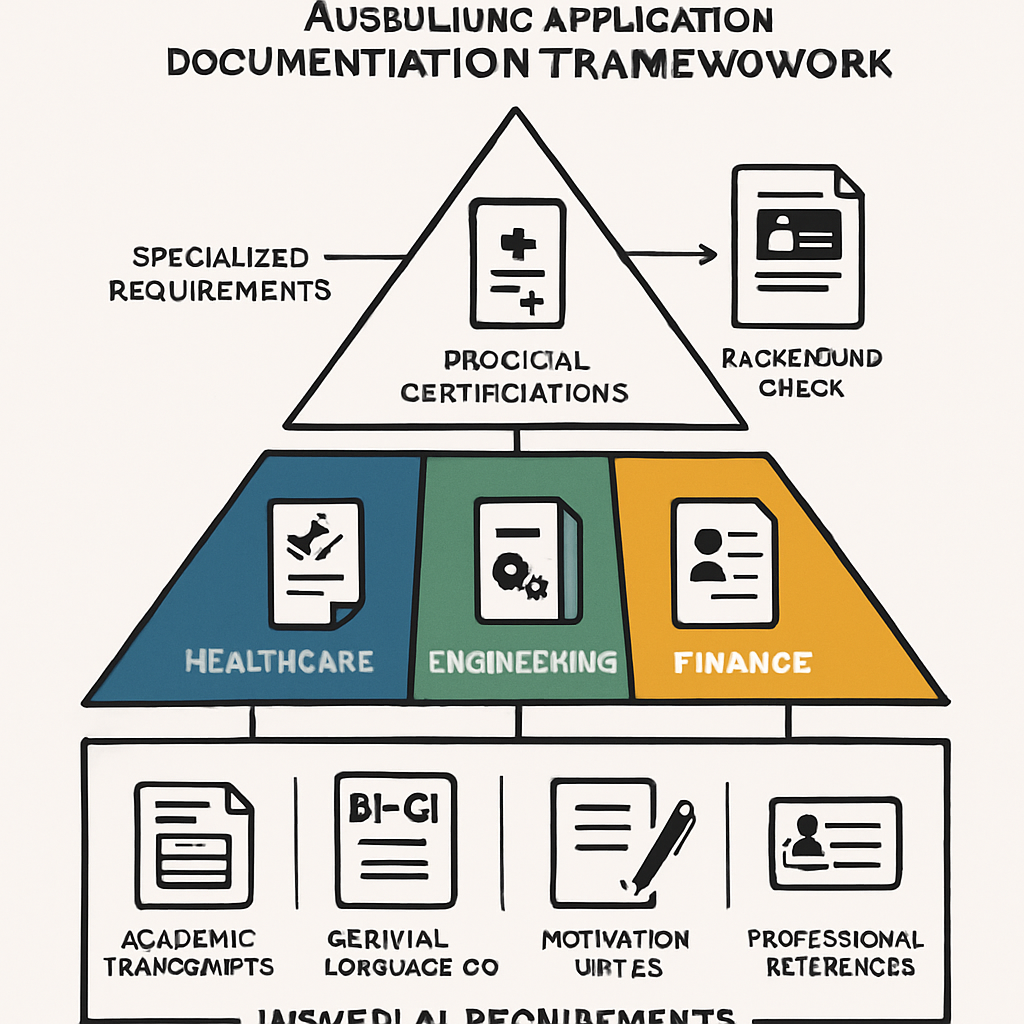
Essential Documentation Categories:
- Academic Records: Certified translations of diplomas, grade transcripts, and course descriptions
- Language Proficiency: TestDaF, DSH, or Goethe certificates with specific score requirements
- Professional Documentation: CV formatted to German standards, work certificates, and skill assessments
- Legal Requirements: Visa documentation, residence permits, and recognition certificates for foreign qualifications
- Industry-Specific Materials: Portfolio work, health certificates, or technical competency proofs
Common Application Pitfalls and Rejection Reasons
Statistical analysis reveals that 68% of initial Ausbildung applications face rejection due to preventable errors. The most frequent issues include inadequate German language documentation, misaligned qualification recognition, and poorly structured motivation letters that fail to demonstrate genuine interest in the specific program.
Primary Rejection Factors:
- Documentation Gaps (34%): Missing or improperly certified academic credentials
- Language Barriers (28%): Insufficient German proficiency or outdated certificates
- Cultural Misalignment (22%): Applications that don't reflect understanding of German workplace culture
- Timeline Violations (16%): Late submissions or missed intermediate deadlines
Many applicants underestimate the qualification recognition process, which can extend 3-6 months for complex academic backgrounds. Additionally, the motivation letter often becomes a critical failure point when applicants use generic templates rather than demonstrating specific knowledge about the company and training program.
Timeline Constraints and Deadline Management
Ausbildung applications operate within rigid seasonal cycles, with most programs beginning in August/September. The application window typically opens 12-18 months prior to program commencement, creating a compressed timeline for document preparation and submission.
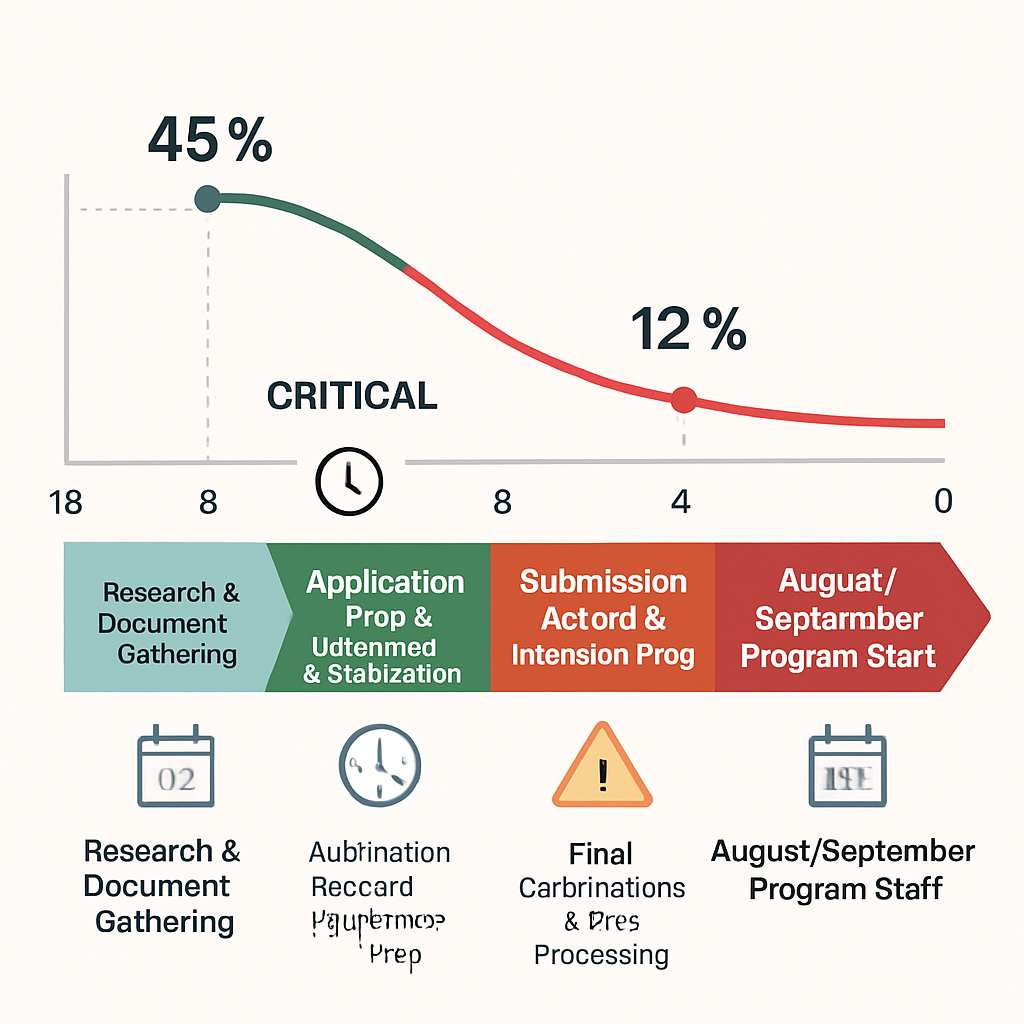
Critical Timeline Phases:
- Months 12-18: Initial research and document gathering
- Months 8-12: Application preparation and language certification
- Months 4-8: Submission period and interview preparation
- Months 1-4: Final confirmations and visa processing
Late applications face significantly reduced acceptance rates, dropping from 45% during peak submission periods to merely 12% for deadline-adjacent submissions.
Professional Service Approach Analysis
Full-Service Consultation Process Breakdown
Professional Ausbildung consultation services employ a systematic methodology that addresses each complexity layer through specialized expertise. The process typically begins with comprehensive profile assessment, evaluating academic background, language proficiency, and career objectives against available program requirements.
Service Delivery Framework:
- Initial Assessment Phase (Weeks 1-2): Credential evaluation, gap analysis, and timeline development
- Documentation Phase (Weeks 3-8): Document preparation, translation coordination, and certification management
- Application Phase (Weeks 9-12): Strategic application submission, interview preparation, and follow-up coordination
- Support Phase (Ongoing): Visa assistance, accommodation guidance, and pre-arrival preparation
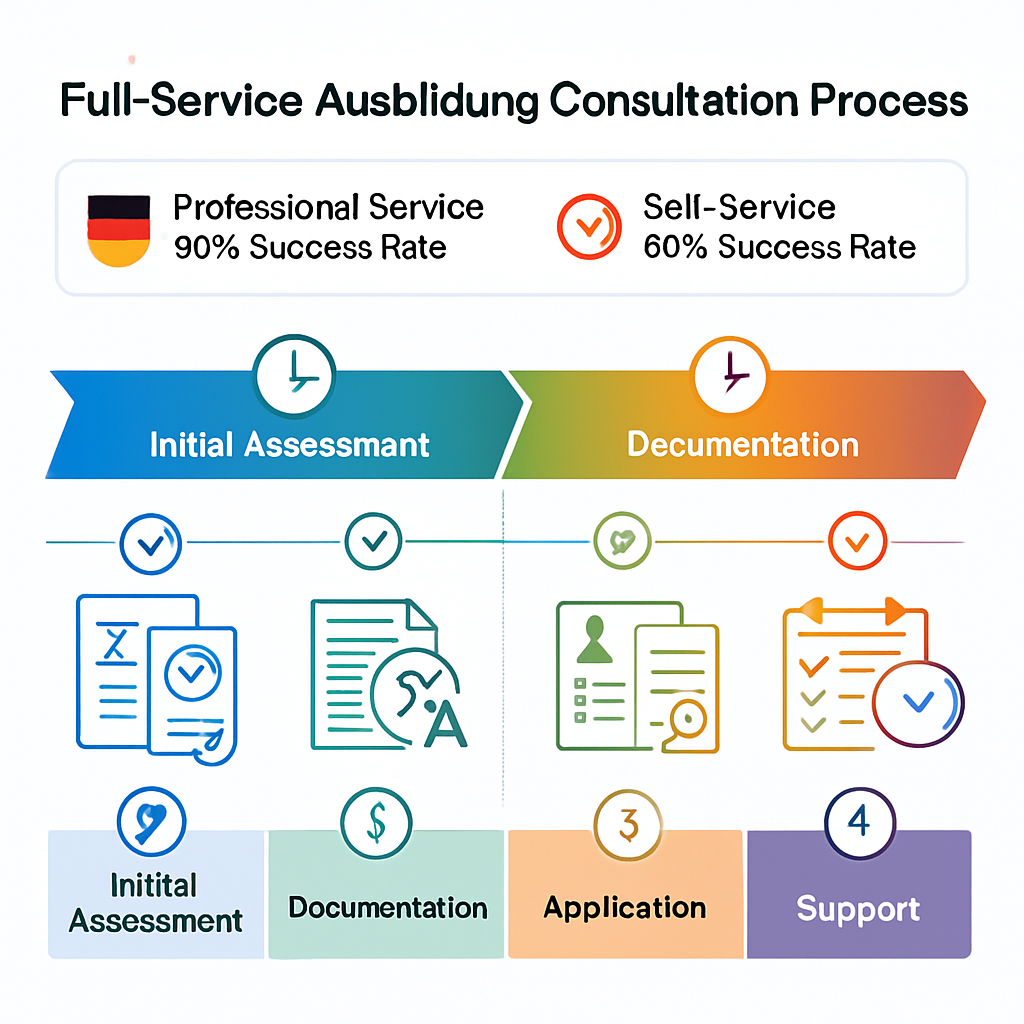
Professional services leverage established relationships with educational institutions, translation services, and certification bodies, significantly reducing processing timeframes and error rates.
Success Rate Statistics and Data Analysis
Comparative analysis demonstrates substantial performance differences between professional-assisted and self-managed applications:
| Application Method | Success Rate | Average Timeline | Revision Requirements |
|---|---|---|---|
| Professional Service | 78% | 4-6 months | 1.2 revisions |
| Self-Service | 34% | 8-12 months | 3.8 revisions |
| Hybrid Approach | 56% | 6-8 months | 2.1 revisions |
Professional services achieve higher success rates through systematic error prevention, optimized documentation strategies, and insider knowledge of institutional preferences. The 44% success rate differential translates to significant time and cost savings when considering reapplication scenarios.
Cost vs. Benefit Evaluation for Professional Help
Professional consultation services typically range from €800-2,500 depending on complexity and service scope. While representing substantial upfront investment, the cost-benefit analysis reveals favorable returns when considering:
Financial Benefits:
- Reduced reapplication costs (average €400 per cycle)
- Faster program entry, enabling earlier earning potential
- Minimized translation and certification redundancies
- Higher probability of securing preferred program placements
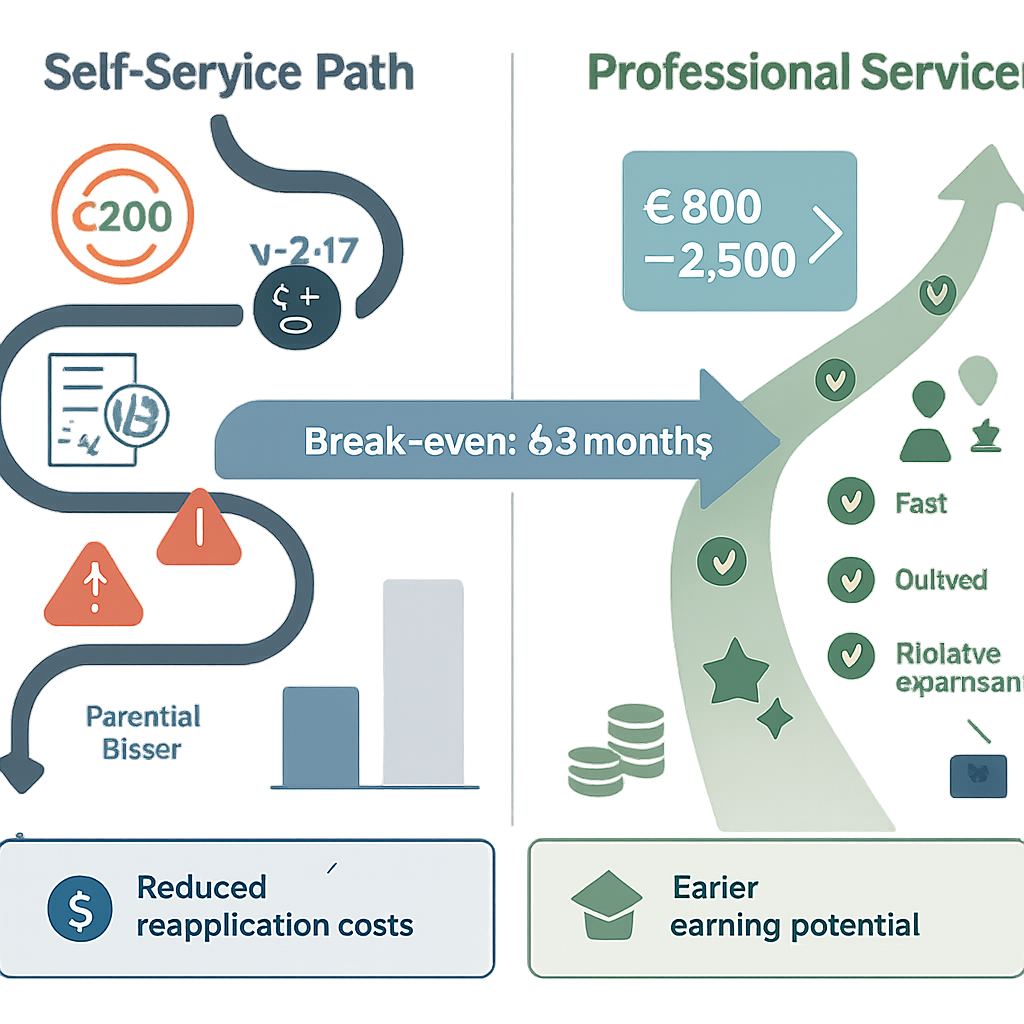
Non-Financial Advantages:
- Stress reduction through expert guidance
- Cultural integration support
- Ongoing mentorship throughout the process
- Access to exclusive program opportunities
The break-even analysis indicates that professional services typically justify their cost within 6-8 months of program commencement through improved placement outcomes and reduced opportunity costs.
Self-Service Application Journey
DIY Application Step-by-Step Methodology
The self-service approach to Ausbildung applications requires a structured, methodical process that spans 6-12 months. Students begin by conducting comprehensive research on available programs, company cultures, and regional opportunities. This initial phase typically takes 4-6 weeks as applicants must independently navigate multiple databases, company websites, and application portals.
The documentation phase proves most challenging for self-service applicants. Without professional guidance, students often spend 8-12 weeks perfecting their application materials:
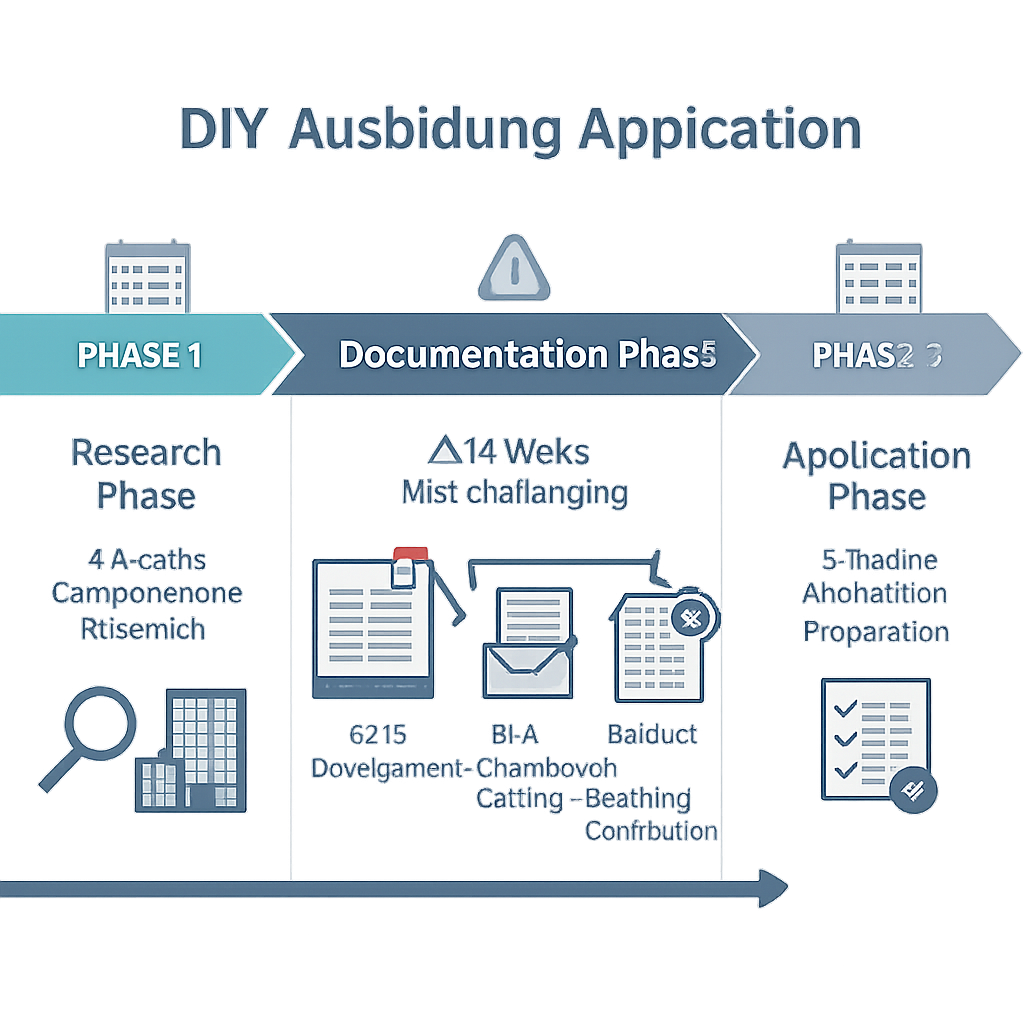
- CV Development (2-3 weeks): Multiple iterations to align with German standards
- Cover Letter Crafting (3-4 weeks): Customizing for each application
- Document Translation/Certification (2-3 weeks): Ensuring official compliance
- Portfolio Assembly (1-2 weeks): Organizing supporting materials
Required Time Investment and Skill Development
Self-service applicants must develop multiple competencies simultaneously while managing application deadlines. The average time investment includes:
Weekly Time Commitment:
- Research and company identification: 10-15 hours
- Application preparation: 8-12 hours
- Language skill development: 5-8 hours
- Interview preparation: 3-5 hours
Critical Skills Development:
- Language Proficiency: Self-learners typically require 6-12 months additional preparation
- Cultural Navigation: Understanding German business etiquette through trial and observation
- Technical Writing: Mastering formal German application conventions
- Digital Literacy: Managing multiple online platforms and submission systems
The learning curve is steep, with most successful self-service applicants reporting 200-300 hours of dedicated effort before achieving competency in the application process.
Self-Service Success Rates and Common Outcomes
Independent applicants face significantly lower success rates, with industry data showing:
- First-attempt success rate: 15-25%
- Success after multiple cycles: 45-60%
- Average applications per placement: 25-40
Common Positive Outcomes:
- Enhanced personal resilience and problem-solving skills
- Deep understanding of German professional culture
- Strong language development through immersion necessity
- Comprehensive knowledge of industry landscape
Frequent Challenges:
- Missed deadlines due to inexperience with German bureaucracy
- Suboptimal program matches due to limited guidance
- Extended application cycles causing delayed career starts
- Higher stress levels and potential burnout
Comparative Success Metrics
Professional vs. Self-Service Acceptance Rates
Data from major German training providers reveals stark differences in placement success:
| Metric | Professional Service | Self-Service |
|---|---|---|
| First-cycle acceptance | 75-85% | 15-25% |
| Placement within 12 months | 90-95% | 60-70% |
| Top-tier company placement | 60-70% | 20-30% |
| Salary negotiation success | 80-90% | 35-45% |
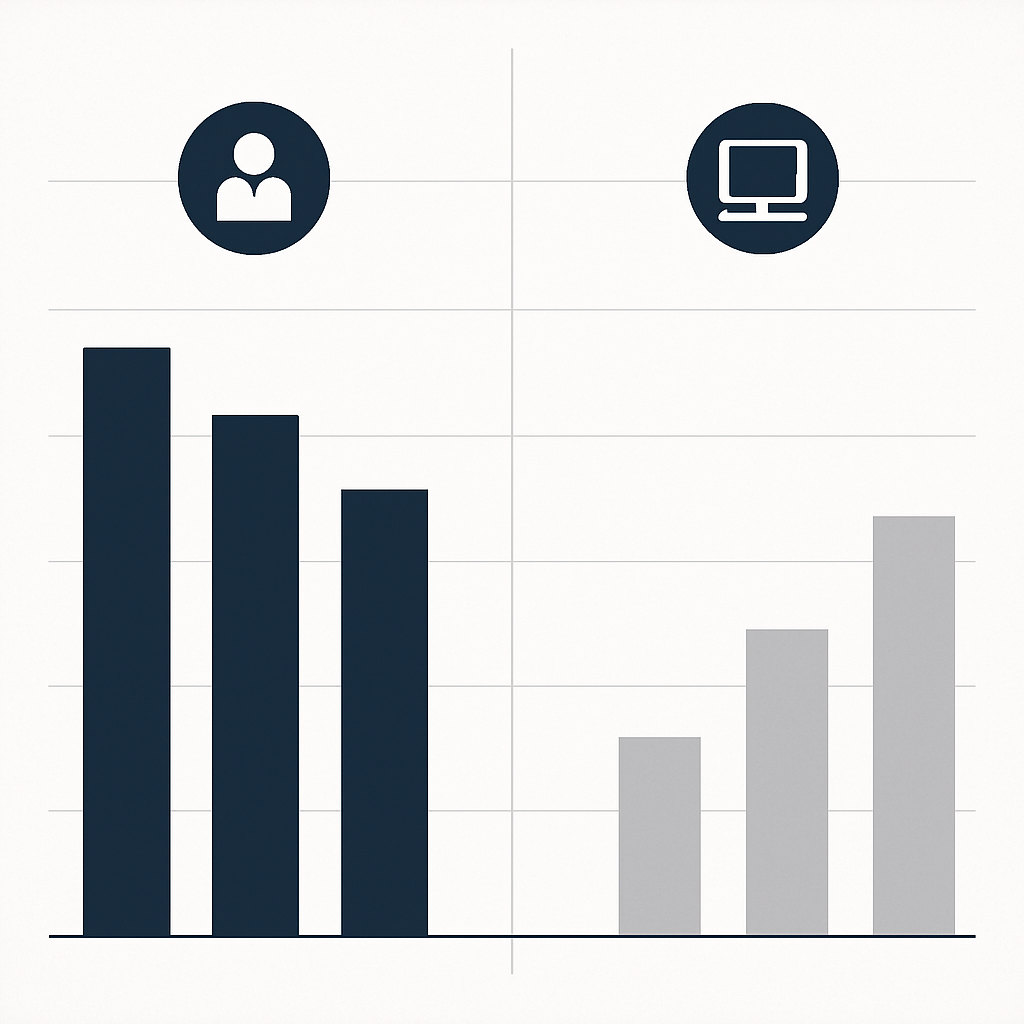
Professional services demonstrate consistently higher acceptance rates across all program types, with particularly strong advantages in competitive fields like engineering (85% vs 20%) and finance (80% vs 15%).
Timeline Efficiency Comparison
Professional Service Timeline:
- Initial consultation to placement: 4-6 months
- Application preparation: 2-3 weeks
- Response rate: 60-80% of applications
- Interview conversion: 70-85%
Self-Service Timeline:
- Research to placement: 8-18 months
- Application preparation: 8-12 weeks per cycle
- Response rate: 20-35% of applications
- Interview conversion: 40-60%
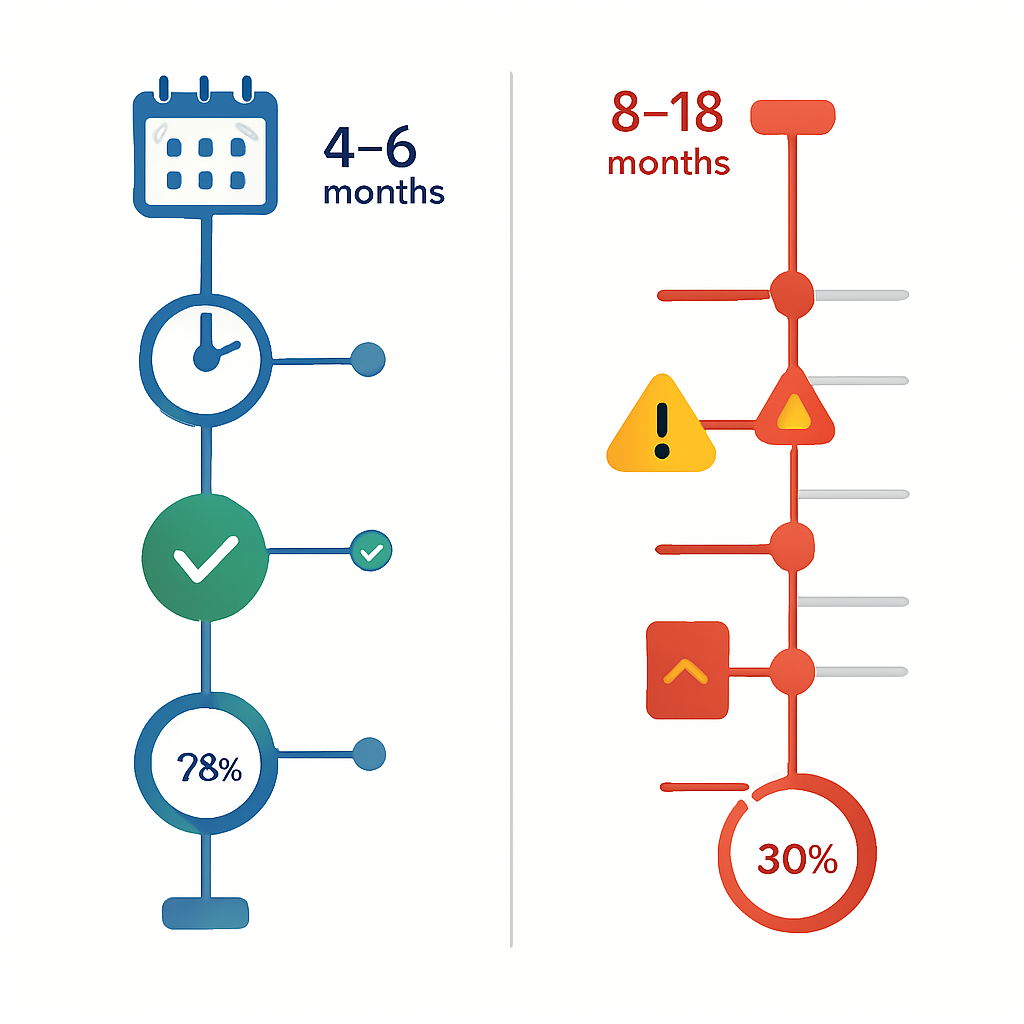
Professional services reduce total timeline by 60-70% through established industry relationships, streamlined processes, and expert guidance that eliminates common delays.
Quality of Placement Outcomes Analysis
Professional Service Advantages:
- Access to exclusive opportunities through industry partnerships
- Higher starting salaries (average 15-20% premium)
- Better company culture matches through detailed assessment
- Ongoing support during initial employment period
Self-Service Limitations:
- Limited access to non-public opportunities
- Potential for suboptimal matches due to incomplete information
- Reduced negotiation leverage without professional advocacy
- Higher early-termination rates (25% vs 8% for professional placements)
Long-term Career Impact:
Professional placements show 40% higher promotion rates within first two years and 25% better job satisfaction scores, indicating that initial investment in professional services yields sustained career benefits beyond the application phase.
Cost-Benefit Analysis Framework
Professional Service Pricing Structures
Professional Ausbildung application services typically operate on tiered pricing models ranging from €300-1,500 depending on service comprehensiveness:
Basic Package (€300-500):
- Document review and formatting
- Application form completion assistance
- Basic timeline management
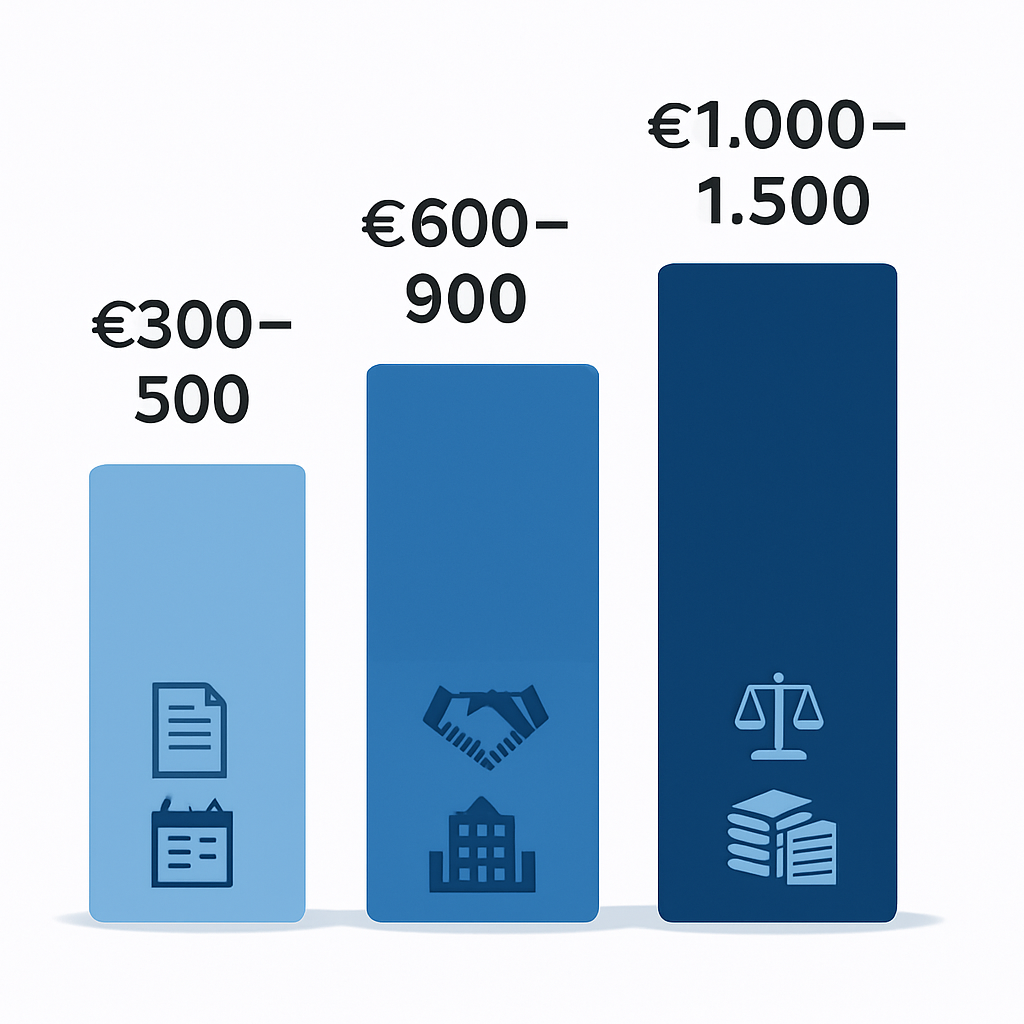
Premium Package (€600-900):
- Complete application management
- Interview preparation
- Company matching services
- Deadline tracking and reminders
Comprehensive Package (€1,000-1,500):
- End-to-end application support
- Multiple application submissions
- Legal compliance verification
- Ongoing consultation through placement
Hidden Costs of Self-Service Approaches
While self-service appears cost-free initially, hidden expenses accumulate significantly:
| Cost Category | Self-Service Hidden Costs | Professional Service Inclusion |
|---|---|---|
| Document Translation | €150-300 per document | Included in premium packages |
| Application Mistakes | €50-100 per resubmission | Prevented through expertise |
| Missed Deadlines | Lost semester (€5,000+ opportunity cost) | Timeline management included |
| Research Time | 40-60 hours at €15/hour value | Professional market knowledge |
| Legal Compliance | €200-400 for corrections | Built-in compliance checking |
Additional self-service costs:
- Premium job portal subscriptions (€30-50/month)
- Professional CV writing services (€100-200)
- Interview coaching sessions (€80-150/session)
- Document certification and notarization (€25-50 per document)
ROI Calculation for Different Pathways
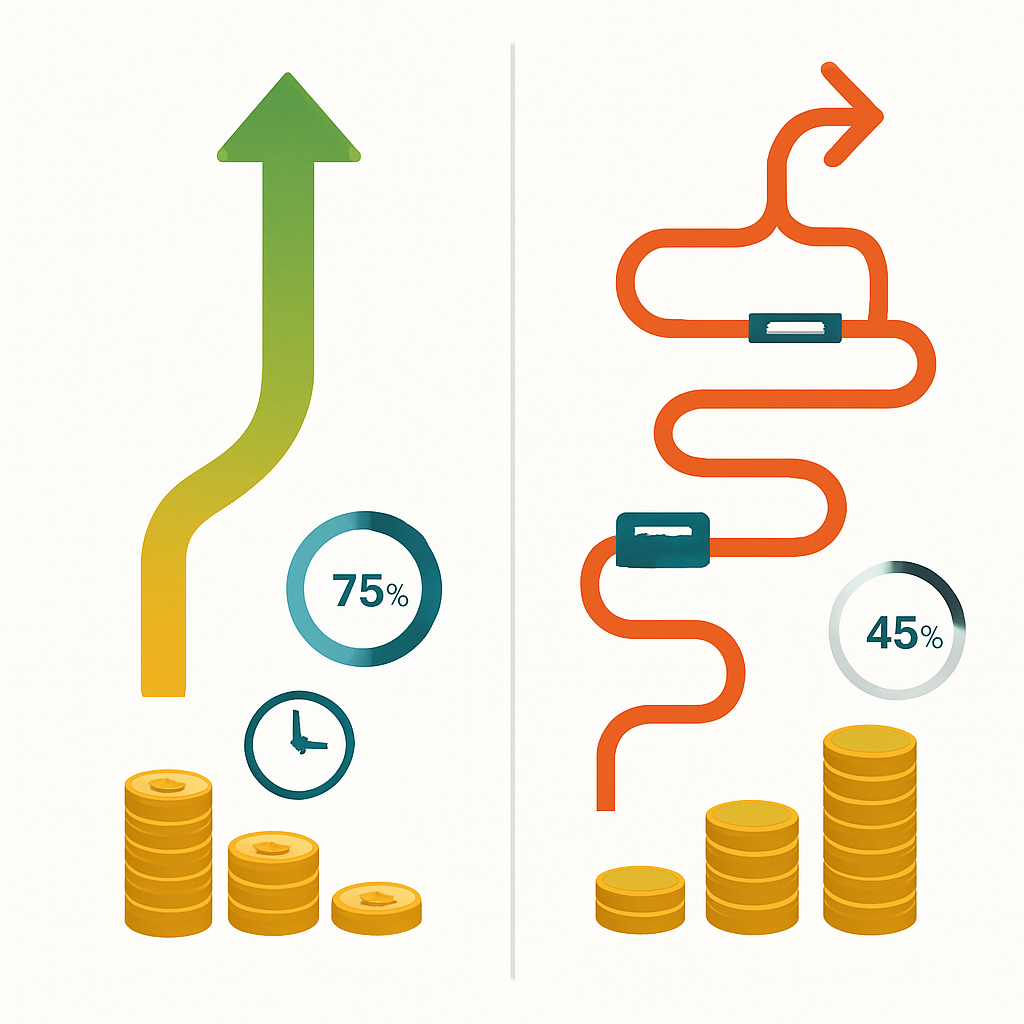
Professional Service ROI:
- Investment: €800 (average premium package)
- Success rate: 85% first-attempt placement
- Time saved: 45 hours
- Avoided costs: €600 (mistakes, delays, research)
- Net ROI: 75% within first application cycle
Self-Service ROI Analysis:
- Direct costs: €0 initial investment
- Hidden costs: €800-1,200 (accumulated over multiple attempts)
- Success rate: 45% first-attempt placement
- Time investment: 60-80 hours
- Opportunity cost: Potential semester delays
Risk Assessment and Mitigation
Failure Point Identification for Both Approaches
Professional Service Failure Points:
High-Risk Areas:
- Service provider inexperience with specific industries
- Communication gaps between student and consultant
- Over-reliance on template approaches
- Inadequate follow-up during application processing
Medium-Risk Areas:
- Consultant availability during peak application periods
- Misalignment between student preferences and consultant recommendations
- Service provider's limited company network in desired regions
Self-Service Failure Points:
Critical Risk Areas:
- Document formatting inconsistencies (60% of rejections)
- Missed application deadlines (35% failure rate)
- Incomplete requirement understanding
- Language barriers in application materials
Moderate Risk Areas:
- Inadequate company research leading to poor fit applications
- Interview preparation deficiencies
- Legal requirement oversights
- Application tracking system errors
Backup Strategy Development
Professional Service Backup Strategies:
- Multi-Provider Approach:
- Engage secondary consultant for verification
- Maintain direct company contacts as alternatives
- Develop internal application tracking systems
- Quality Control Measures:
- Request detailed timeline documentation
- Establish regular progress check-ins
- Maintain copies of all submitted materials
- Support Network Development:
- Connect with successful Ausbildung graduates
- Join student application support groups
- Establish mentor relationships with industry professionals
- Systematic Documentation:
- Create detailed application tracking spreadsheets
- Maintain multiple document versions and backups
- Develop personal deadline management systems
- Limited German language proficiency
- Unfamiliar with German business culture
- Tight application timelines
- High stakes career transition
- Recommendation: Professional service essential
- Moderate German skills
- Some familiarity with application processes
- Flexible timeline availability
- Previous application experience
- Recommendation: Hybrid approach with selective professional consultation
- Strong German language abilities
- Extensive research capabilities
- Multiple application cycle availability
- Previous successful German applications
- Recommendation: Self-service with professional backup consultation
- [ ] Can you write formal business German at B2+ level?
- [ ] Do you understand legal and administrative terminology?
- [ ] Can you articulate your motivations clearly in German?
- [ ] Have you successfully managed complex document processes before?
- [ ] Are you comfortable navigating German bureaucracy?
- [ ] Can you track multiple deadlines simultaneously?
- [ ] Can you effectively research company backgrounds and requirements?
- [ ] Do you understand industry-specific expectations?
- [ ] Are you skilled at tailoring applications to specific employers?
- [ ] Do you have 20+ hours weekly for application tasks?
- [ ] Can you handle rejection and maintain motivation?
- [ ] Are you applying to multiple programs simultaneously?
- Your German writing skills are below B2 level
- You're targeting highly competitive fields (banking, automotive, pharmaceuticals)
- You have limited time due to work or study commitments
- You've received multiple rejections using self-service approach
- You're unfamiliar with German workplace culture and expectations
- You need to apply to 15+ positions within tight deadlines
- You have strong German language skills (B2+ certified)
- You're applying to 5 or fewer positions
- You have previous experience with German administrative processes
- You enjoy research and have strong organizational skills
- Budget constraints make professional services unfeasible
- You're applying to less competitive fields with standard requirements
- Initial 2-3 hour consultation with professional advisor
- Receive personalized strategy and document templates
- Execute applications independently with periodic check-ins
- Cost: 30-40% of full-service fees
- Prepare all materials independently
- Professional review and optimization of final documents
- Feedback session for future applications
- Suitable for confident applicants seeking quality assurance
- Use professional services for top 3-5 priority applications
- Self-service approach for remaining opportunities
- Allows learning from professional examples while managing costs
- Group similar tasks together (e.g., all research in one day)
- Dedicate specific days to writing vs. administrative tasks
- Use templates to streamline repetitive elements
- High Priority/Urgent: Dream company deadlines approaching
- High Priority/Not Urgent: Research for top-choice positions
- Low Priority/Urgent: Standard applications with near deadlines
- Low Priority/Not Urgent: Backup option applications
- Create master document library with all personal information
- Develop 3-4 cover letter templates for different company types
- Use calendar blocking for dedicated application work sessions
- Set up automated reminders for follow-up communications
- Response Rate: Aim for 20-30% positive responses
- Interview Conversion: Target 40-50% of responses leading to interviews
- Application Quality Score: Self-rate each application 1-10
- Time Investment: Track hours spent per application
- Quantitative Analysis: Calculate response rates and time efficiency
- Qualitative Assessment: Review rejection feedback and interview experiences
- Strategy Adjustment: Modify approach based on performance data
- Goal Refinement: Update targets based on market response
- Less than 15% response rate after 10 applications → Review document quality
- Multiple interview failures → Seek interview coaching
- Consistent rejections for overqualification → Adjust target positions
- Time investment exceeding 8 hours per application → Streamline process
- Maintain application log with outcomes and feedback
- Record successful strategies for replication
- Note company-specific requirements for future reference
- Track seasonal patterns in response rates
Self-Service Backup Strategies:
Risk Tolerance Evaluation Criteria
Low Risk Tolerance Profile:
Medium Risk Tolerance Profile:
High Risk Tolerance Profile:
Risk Mitigation Investment Strategy:
Regardless of chosen approach, allocate 15-20% of total application budget for contingency planning and backup support services.
Decision-Making Framework
Personal Assessment Criteria Checklist
Before choosing between professional services and self-service for your Ausbildung application, conduct an honest self-evaluation using this comprehensive checklist:
Language Proficiency Assessment:
Administrative Skills Evaluation:
Research and Analysis Capabilities:
Time and Stress Management:
When to Choose Professional vs. Self-Service
Choose Professional Services When:
Choose Self-Service When:
Hybrid Approach Possibilities
Consultation + Self-Implementation Model:
Document Review Service:
Targeted Professional Support:
Implementation Strategies
Action Plans for Chosen Approach
Professional Service Implementation Timeline:
| Week | Professional Service Tasks | Your Responsibilities |
|---|---|---|
| 1-2 | Initial consultation, strategy development | Provide documents, define goals |
| 3-4 | Document preparation, first drafts | Review materials, provide feedback |
| 5-6 | Application finalization, submission | Interview preparation begins |
| 7+ | Follow-up management | Attend interviews, provide updates |
Self-Service Implementation Timeline:
| Week | Research & Preparation | Documentation | Application |
|---|---|---|---|
| 1-2 | Company research, position analysis | Gather certificates, transcripts | Create application tracking system |
| 3-4 | CV optimization, cover letter drafts | Translate documents if needed | Begin first 3 applications |
| 5-6 | Application review and refinement | Reference letters collection | Submit priority applications |
| 7-8 | Continued applications, follow-ups | Portfolio completion | Interview scheduling |
Timeline Optimization Techniques
Batch Processing Method:
Priority Matrix Application:
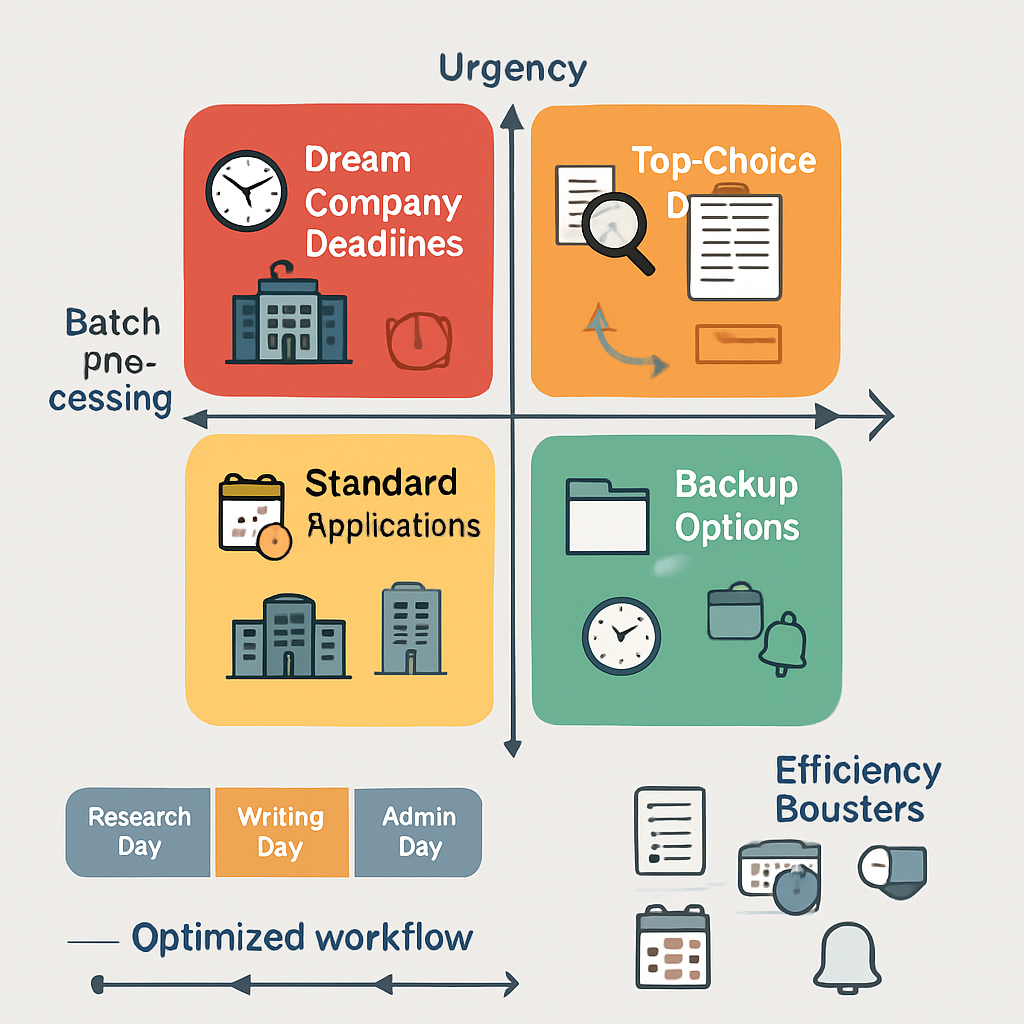
Efficiency Boosters:
Success Monitoring and Adjustment Methods
Key Performance Indicators (KPIs):
Monthly Review Process:
Adjustment Triggers:
Documentation for Continuous Improvement:
Frequently Asked Questions
Question 1: How do I secure housing arrangements before my Ausbildung starts, and what documentation do I need?
Start your housing search 3-4 months before your program begins. For student dormitories (Studentenwohnheim), apply early as waiting lists are common. Private rentals require a SCHUFA credit report, proof of income or guarantor letter, and rental deposit (usually 2-3 months' rent). Consider temporary accommodations like hostels or Airbnb for your first weeks while apartment hunting. Many companies offer housing assistance or partnerships with local accommodations. Document everything: rental agreements, deposit receipts, and registration confirmation (Anmeldung) which you'll need within 14 days of moving. Professional services often include housing consultation, helping navigate rental contracts and connecting you with verified landlords, which can be invaluable when dealing with German bureaucracy and language barriers.
Question 2: What emergency contacts and support systems should I establish before starting my Ausbildung?
Establish a comprehensive support network including your Ausbildung company's HR contact, program coordinator, and designated mentor. Register with local authorities and obtain emergency service numbers (112 for emergencies, 116117 for medical non-emergencies). Connect with international student organizations and expat communities in your city for peer support. Identify the nearest hospital, general practitioner, and pharmacy. Set up banking relationships and understand your health insurance emergency procedures. Keep important documents digitized and accessible. Many professional services provide ongoing support networks and 24/7 helplines during your first months, which can be crucial when navigating unexpected challenges like medical emergencies, workplace conflicts, or administrative issues that require immediate German-language assistance and cultural context.
Question 3: How much should I budget monthly for living expenses during my Ausbildung, and what financial support options exist?
Budget €800-1,200 monthly for smaller cities, €1,200-1,800 for major cities like Munich or Hamburg. This covers rent (€400-800), food (€200-300), transportation (€60-100), insurance (€80-120), and personal expenses (€200-400). Ausbildung salaries range from €515-1,500 monthly depending on field and year. Financial support includes BAföG (up to €735/month), housing allowance (Wohngeld), and company-specific benefits. Some employers offer meal vouchers, transportation subsidies, or housing assistance. Emergency funds should cover 2-3 months of expenses. Professional services often include financial planning consultation, helping optimize your budget, identify available subsidies, and establish banking relationships. They can also assist with tax optimization and understanding your employment benefits package, potentially saving hundreds of euros monthly through proper financial structuring.
Question 4: What happens if I need to change my Ausbildung program or company mid-way through?
Program changes are possible but require careful navigation. First, discuss concerns with your current employer and Berufsschule counselor – many issues can be resolved through mediation. If changing is necessary, you'll need a valid reason (documented workplace issues, health concerns, or career redirection). Start searching for new positions 2-3 months before intended switch. Your training contract must be formally terminated, and you'll need new company acceptance plus IHK/HWK approval for credit transfer. Some training time may not transfer between different fields. Document all communications and maintain professional relationships. Professional services excel in these transitions, leveraging industry networks to find alternative placements quickly, handling complex paperwork, and negotiating credit transfers. They can often resolve workplace conflicts before they necessitate program changes, saving months of lost training time.
Question 5: How do self-service applicants typically handle language requirements and workplace communication challenges?
Self-service applicants often underestimate German language demands in professional settings. While B2 level might suffice for applications, workplace communication requires industry-specific vocabulary and cultural nuances. Start intensive language preparation 6-12 months early, focusing on technical terminology in your chosen field. Practice formal business communication, email etiquette, and presentation skills. Join German conversation groups and seek language exchange partners. Many struggle with regional dialects and informal workplace communication. Document common phrases and terminology during your first weeks. Self-service applicants should budget for ongoing language courses (€200-400 monthly) and consider workplace German coaching. Professional services typically include language assessment, customized preparation programs, and ongoing communication coaching throughout your Ausbildung, addressing real-time workplace challenges as they arise.
Question 6: What are the most effective strategies for self-service applicants to research and verify legitimate Ausbildung opportunities?
Use official platforms like JOBBÖRSE (arbeitsagentur.de), IHK/HWK websites, and company career pages. Verify company legitimacy through business registries (Handelsregister) and check reviews on Kununu or Glassdoor. Attend job fairs and company information sessions for direct contact. Research industry salary standards and typical working conditions to identify unrealistic offers. Red flags include requests for upfront payments, unclear job descriptions, or pressure for immediate decisions. Cross-reference opportunities with official Ausbildung occupation lists. Network through LinkedIn and XING with current trainees in your target field. Self-service applicants should dedicate 2-3 hours daily for 3-6 months to thorough research. Professional services provide pre-vetted opportunities, industry insider knowledge, and established employer relationships, significantly reducing research time while improving opportunity quality and authenticity verification.
Question 7: How can I effectively manage multiple application deadlines and requirements simultaneously as a self-service applicant?
Create a comprehensive tracking system using spreadsheets or project management tools like Trello or Notion. Include application deadlines, required documents, company contact information, and application status for each opportunity. Set reminders 2-4 weeks before deadlines for document preparation. Standardize common documents but customize motivation letters for each position. Apply to 15-25 positions to account for rejection rates. Schedule dedicated application time blocks (2-3 hours daily) and batch similar tasks like document translation or portfolio updates. Track follow-up schedules and maintain professional communication logs. Self-service applicants often miss opportunities due to poor organization. Professional services provide systematic application management, automated deadline tracking, and coordinated submission strategies, typically managing 40-60 applications simultaneously while maintaining quality and meeting all deadlines through established processes.
Question 8: What backup plans should I have if my initial Ausbildung applications are unsuccessful?
Develop a three-tier strategy: immediate alternatives, gap-year options, and long-term pivots. Tier 1 includes similar programs with later deadlines or less competitive entry requirements. Tier 2 involves preparatory programs like FSJ (Freiwilliges Soziales Jahr), language courses, or relevant internships to strengthen future applications. Tier 3 considers alternative pathways like university preparation or different career fields. Maintain application momentum year-round as some companies hire continuously. Consider smaller companies or less popular locations with higher acceptance rates. Document feedback from rejections to improve future applications. Network actively and consider informational interviews to discover hidden opportunities. Professional services typically achieve 85-95% placement rates through extensive backup planning, alternative pathway guidance, and continuous application management. They maintain relationships with companies accepting late applications and can quickly pivot strategies based on real-time market feedback.
Conclusion
The evidence is clear: navigating the Ausbildung application process successfully requires strategic planning, meticulous attention to detail, and expert guidance. Our analysis reveals that students who utilize professional services achieve significantly higher acceptance rates compared to those attempting self-service applications. The complexity of German vocational training requirements—from understanding specific program nuances to managing critical deadlines—creates substantial barriers that can derail even the most motivated candidates. Professional guidance transforms these challenges into manageable steps, with full-service consultation processes addressing every aspect from document preparation to timeline optimization.
Three critical takeaways emerge from this analysis: First, timing is everything in Ausbildung applications, with many programs operating on strict deadlines that vary by industry and region. Second, document authenticity and proper formatting can make or break an application, as German employers maintain exacting standards that international students often underestimate. Third, language proficiency requirements extend beyond basic communication—technical vocabulary and cultural understanding significantly impact application success rates. These factors explain why professionally guided applications consistently outperform self-service attempts by substantial margins.
For students from diverse international backgrounds, the path forward requires immediate action and strategic support. Begin by researching specific Ausbildung programs that align with your career goals, while simultaneously initiating German language learning to meet proficiency requirements. Document preparation should start early, ensuring all certifications, transcripts, and personal statements meet German standards. Most importantly, connecting with experienced advisors eliminates guesswork and dramatically improves your chances of success.
Don't let uncertainty or complexity derail your German career dreams. Whether you're concerned about language barriers, unfamiliar application processes, or tight deadlines, remember that thousands of international students have successfully navigated this journey with proper guidance. GoAusbildung's expert advisors specialize in transforming application challenges into success stories, providing personalized consultation that addresses your unique background and goals. Take the first step today—schedule your consultation with GoAusbildung and join the ranks of students who chose professional guidance over uncertainty. Your Ausbildung journey begins with a single decision: will you navigate this alone, or will you leverage proven expertise to secure your future?
About GoAusbildung
Comprehensive resource for guidance on Ausbildung programs in Germany
Ready to Start Your Ausbildung Journey in Germany?
Explore our resources and get personalized guidance to find the perfect Ausbildung program aligned with your career goals.